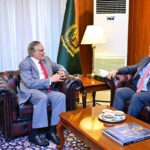ISLAMABAD, Apr 06 (APP):The Supreme Court Wednesday turned down the plea of Pakistan Tehreek-e-Insaf’s (PTI) counsel Babar Awan for an in-camera hearing on the Lettergate issue.
The PTI’s counsel had asked the five-member larger SC bench, headed by Chief Justice of Pakistan Umar Ata Bandial, whether an in-camera hearing was possible as his client wanted to keep the Foreign Office’s briefing before the court.
The CJP, however, rejected Awan’s request, observing that the court was not currently asking for the letter.
The bench comprising Justic Ijaz Ul Ahsan, Justice Mohammad Ali Mazhar, Justice Munib Akhtar and Justice Jamal Khan Mandokhail was heard the suo moto notice case on the ruling by the National Assembly (NA) deputy speaker on the vote of no-confidence motion against Prime Minister Imran Khan.
Arguing the case, Babar Awan said the Muttahida Qaumi Movement (MQM), the Tehreek-i-Labbaik Pakistan (TLP), Pashtun Tahaffuz Movement (PTM) and Jamaat-i-Islam (JI) were not made respondents in the case. Likewise, the Balochistan Awami Party and the Rah-i-Haq were part of the parliament, but were also made respondents.
He said the opposition parties termed the deputy speaker’s ruling malicious and unconstitutional, but ignored what had happened in the Sindh House Islamabad and Avari Hotel Lahore. No one said any word about Article 63-A of the Constitution.
Awan said the opposition was claiming to save parliamentary democracy while Pakistan Muslim League-Nawaz’s Shehbaz Sharif had demanded the formation of a judicial commission to probe the matter.
He said the opposition wanted the court to issue a short order in its favour immediately. They wanted to set aside the mention of National Security Committee in the deputy speaker’s ruling, he added.
The chief justice asked whether the speaker had the power to issue a ruling by deviating from the order of the day, and whether it was possible to set aside a constitutional process.
He said the court would not take rumours and allegations into account. He also told Awan to refrain from delivering a long speech, directing him to inform the court about the basis on which the speaker gave the ruling.
Babar Awan said that a meeting took place between Pakistani officials and a diplomat from another country and the cipher of their conversation arrived on March 7. The head of mission and the defence attache were also present in the meeting, he added.
The chief justice remarked that the ruling seemed to be based on accusations not facts.
Upon this, Attorney General for Pakistan (AGP) Khalid Jawed Khan said such facts should come from the government and not a political party as they concerned the foreign affairs.
The CJP responded that the court did not want to interfere in the foreign affairs.
Babar Awan said four things were underlined in the letter. More details could not be revealed due to the Official Secrets Act.
He said the Foreign Office approached the prime minister and the foreign minister after reviewing the letter. The FO’s director general concerned gave a detailed briefing on the letter in the cabinet meeting.
Babar Awan said Pakistan issued a demarche to the said country, who had made the threat.
Justice Mandokhail said under the Constitution loyalty to the state was must, and asked what should be done with the MNAs who were not loyal with the state.
Babar Awan said he belonged to a political party whose 22 members of the National Assembly had been purchased, while its 40 members of Punjab Assembly were holed up in a hotel.
He requested the court to also hear the case of party dissidents with the case. He said the parliamentarians talked about honesty but what had happened in the Parliament was honesty.
Justice Mandokhail said the political parties should think for themselves in order to prevent floor crossing. He observed the political parties should themselves anaylse that the same faces were sometimes seen in one party and then in another.
He said the judges had taken an oath to protect the Constitution and they would take a decision that was in favour of the nation.
Justice Akhtar observed that if the court reviewed every ruling of the parliament there would be a disaster.
The CJP said the petitioners wanted the parliamentary proceedings to be reviewed as according to them Article 95 had been violated. The court fully respected the constitutional division of powers, he added.
Chief Justice Bandial asked the government’s counsel what were the basis on which the speaker issued a ruling. Whether the speaker could announce such a ruling without presenting the facts. It was the constitutional point in which the bench had to announce a decision.
He asked Awan to inform the court whether the speaker could issue a ruling that was not on the day’s agenda bypassing Article 95. He asked the PTI’s counsel to defend the ruling with solid evidence.
He also asked Babar Awan about the minutes of NSC meeting.
After Babar Awan, Barrister Ali Zafar, counsel for President Arif Alvi, stared his arguments. He said when the elections of Senate chairman was challenged in the Islamabad High Court, it had ruled that the constitutional elections in parliament were protected from judicial intervention as well.
He said the court could only review the speaker’s ruling on the no-confidence motion if it decided to not consider it as a parliamentary proceeding.
Justice Mandokhail asked what would happen if the speaker announced that the no-confidence motion had succeeded irrespective of the fact that the votes were not enough.
Barrister Ali Zafar said the Parliament should be given a chance to solve its issues itself.
The chief justice said after the ruling, the NA was dissolved and fresh elections were announced. It was decided to go to the public.
He said the PML-N lawyers would be asked what was the issue in going to the public.
Justice Ahsan then asked how someone’s rights were affected by going into elections.
Ali Zafar said any direction from the court on the matter of the deputy speaker’s ruling would exceed its jurisdiction. The case under discussion pertained to the interpretation of Articles 95 and 69. There were six rules for interpreting the provisions of the Constitution and should be understood in accordance with their true spirit rather than just words, he added.
He said just like judicial proceedings could not be debated in the Parliament, courts too could not interfere in the parliamentary proceedings.
He said unfortunately, the petitioners wanted the case to be heard as an appeal against the ruling of the deputy speaker. The case was in fact an interference in the prerogatives of the National Assembly.
Barrister Zafar said even if 10 MNAs were not allowed to vote and were expelled from the House, such a move could not be challenged by anyone.
Upon this, the chief justice remarked that the opposition was stating that a new speaker should come and voting should be held again.
Ali Zafar said approaching the court against the deputy speaker’s ruling was interference in the Parliament’s affairs. Giving instructions to the speaker was equivalent to giving instructions to the Parliament, which was unconstitutional, he added.
The chief justice asked if interference was not possible even if the Constitution was violated.
Ali Zafar said he would submit his arguments on what was constitutional and what was not.
If the House was not satisfied with the speaker, it could opt for a no-confidence motion, but if the speaker’s ruling was reviewed, every decision taken by him would be brought to court.
He said the court had no power to review the speaker’s ruling.
Referring to the speech of Justice (r) Maqbool Baqar, Barrister Ali Zafar said the retired judge talked about a balance between institutions that could only be achieved through mutual respect.
Justice Ijaz asked whether the court could examine the PM’s advice to dissolve the National Assembly. The counsel replied that if the advice came as a result of the ruling then the court could not review it.
Justice Jamal Mandokhel asked how could the ruling of the speaker be terminated.
The counsel replied that only the House could terminate it.
Justice Munib Akhtar asked if there was a decision by the Parliament that had far-reaching ramifications then what should be done.
Ali Zafar replied that the court could not review the Parliament’s decisions.
He said the court could review the impacts of the decision outside the Parliament.
He said the Islamabad High Court, in a case against the election of Senate Chairman Sadiq Sanjrani, had said the House had the constitutional authority to elect the chair. If the court declared that the ruling concerning the no-confidence motion was not part of the parliamentary proceedings only then it could review the ruling, he added.
Justice Mandokhel said What will happen if the speaker announced the success of the no-trust vote even if the votes were not enough to oust the PM.
The counsel replied that those were parliamentary issues and the court could not act as the monitor of Parliament. He urged the court to let the Parliament solve its issues on its own.
Justice Munib asked whether the prime minister’s election was part of the parliamentary proceedings.
Ali Zafar said as per Article 91, it was a part of the parliamentary proceedings.
Addressing the counsel, Chief Justice Bandial said he made an interesting observation that the speaker’s false ruling was also immune from the court’s scrutiny.
He said the elections were announced after the speaker’s ruling and it was stated that they would go to the people for elections. The court would question the PML-N lawyer why they were opposing the fresh elections.
Justice Munib asked whose rights were being affected by the elections.
Justice Mandokhail asked whether the court could ask the prime minister and the president for reasons behind the dissolution of the assembly.
Ali Zafar replied it was not necessary to tell the reasons.
The chief justice said the case was a violation of Article 95. The court could intervene when there was a violation of the Constitution. The bench respected the sanctity of Parliament, he added.
Justice Ijaz asked whether the abrogation of Constitution was also protected.
Justice Mandokhel said the procedures regarding the no-confidence motion and the defectors was enshrined in the Constitution.
He said as per the lawyer’s argument the majority in the House and the speaker’s ruling were two different things. Whether a prime minister could remain in power after losing the majority, he asked
Chief Justice Bandial said in the current case, the prime minister appealed to the nation by announcing elections which was not a bad thing.
He said the court wanted to conclude the case early so it was extending the hearing. It wanted to hear the Attorney General, and Naeem Bukhari as well.
Both the AGP and Naeem Bukhari requested the court that they would present their arguments on Thursday.
Ealier at the outset of hearing, PML-N’s counsel Azam Nazir Tarar informed the bench that the Punjab Assembly deputy speaker had summoned a session for today to elect the new chief minister. The assembly staff were not following the directives issued by the deputy speaker, he alleged.
To this, the chief justice remarked that the court was hearing a very important case and it wanted to wrap up it early. He asked the political parties to solve the issue concerning the Punjab Assembly politically as the apex court could not make a unilateral decision.






